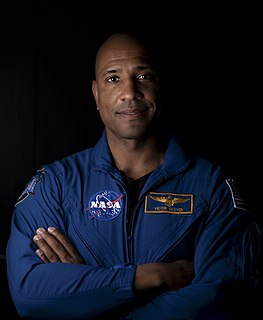A Quote by Victor J. Glover
In the original 'Star Trek' TV series, space stations served as deep-space research laboratories, as well as rendezvous points where starships could dock before exploring the unknown. When we were envisioning our own space station, the applications were similar.
Related Quotes
In America, we have no means of getting to our own Space Station. We have to pay the Russians to put our people up there to send them into space - rendezvous with the Station and bring them back at the end of their stay, and that to me is just wrong. We're supposed to be the world's greatest space-faring nation, and to cancel our own means of getting there I thought was a mistake, even though it would save some money.
When Russians were having troubles, the Space Shuttle supported the Space Station Mir bringing up much needed supplies and replacements, critical spares, really. That they were able to keep their space station going for much longer than they would have without us. So, I think that shows the value of international cooperation.
We were trying to do as much science as we could because that was the main purpose of the international space station. But without the shuttle to bring up heavy laboratory equipment and bring back samples, we were limited by what we could do, but I was proud that we actually accomplished more science that was planned for the flight. And I got a chance to do two Russian spacewalks on that flight, I had become an expert in U.S. spacewalks and using U.S. suits and techniques, and this was a chance to put on a Russian Orlan suit and do two construction space flights outside of the space station.
In 2009 I went up on the space shuttle. I was in space for 16 days and docked at the space station for 11 days. The entire crew did five space walks, of which I was involved with three of them. When you're doing a space walk, you always have a buddy with you. It's a very dangerous environment when you're doing a space walk.
Because now, you know, it's going to be a number of years yet before we have our own new boosters and new spacecraft to go to our own International Space Station and proceed with all the research that we spent $100 billion putting up there to give us that research capability for the future for people right here on Earth.






























